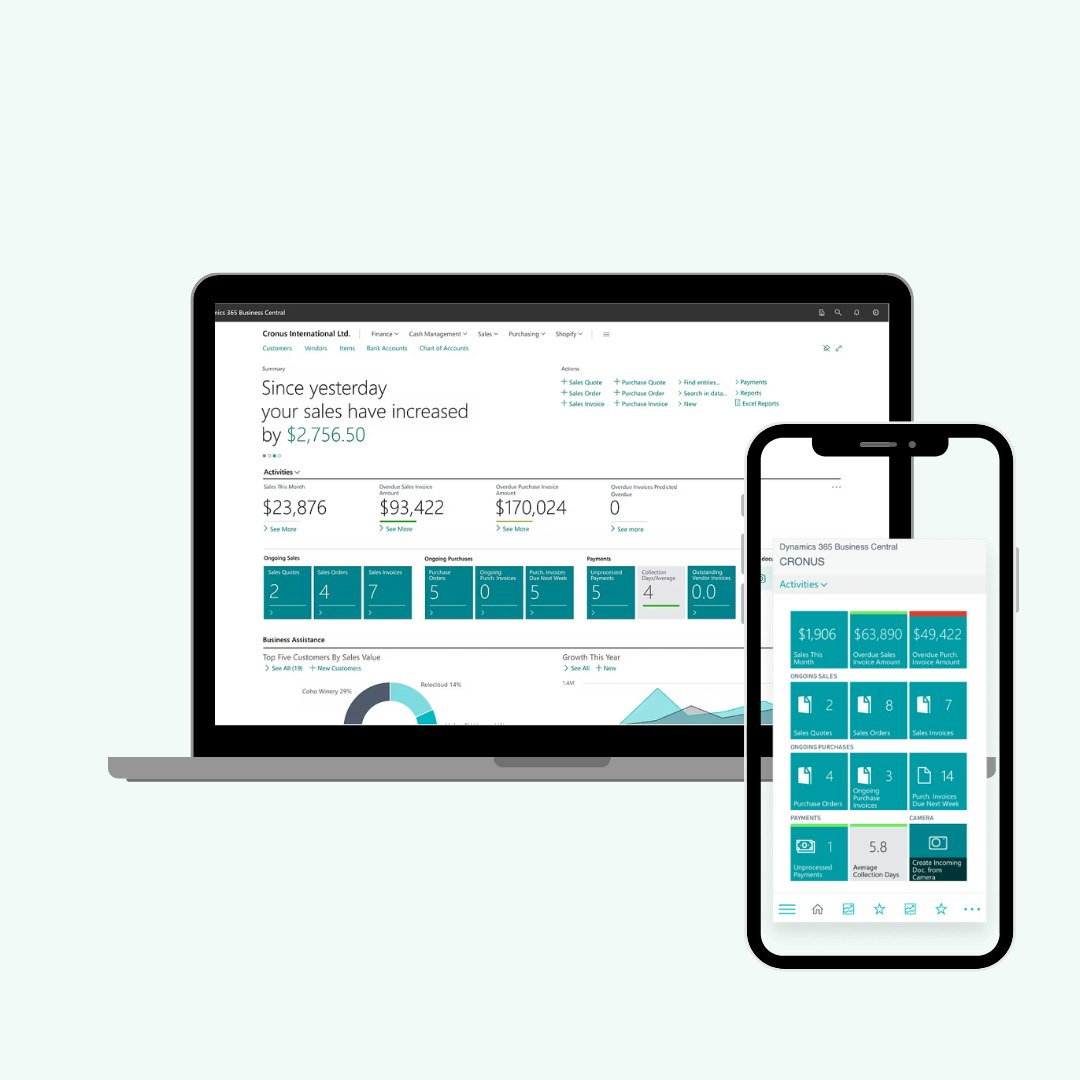Choosing the right ERP (Enterprise Resource Planning) system can make or break a small business. With so many options on the market in 2025, it's crucial to understand what each platform offers—and which one is best suited to support your growth. From cloud flexibility and user experience to integration capabilities and pricing models, the ERP landscape continues to evolve, offering small businesses more power and agility than ever before.
In this guide, we explore the top 10 ERP systems for small businesses in 2025, with a special focus on Microsoft Dynamics 365 Business Central, which we believe stands head and shoulders above the rest. Here’s why.
1. Microsoft Dynamics 365 Business Central – The All-Rounder for Ambitious SMEs
Best for: Businesses seeking a scalable, cloud-based ERP that integrates seamlessly with Microsoft 365 tools.
Why it stands out:
Microsoft Dynamics 365 Business Central continues to dominate in 2025 as the ERP of choice for small and mid-sized enterprises (SMEs). It offers a powerful combination of finance, operations, inventory, sales, and project management—all in a single cloud platform that’s tightly integrated with familiar tools like Outlook, Excel, and Teams.
For growing businesses, Business Central ticks every box:
- Easy to customise and scale
- Real-time insights with embedded Power BI
- Seamless integration with Microsoft 365 ecosystem
- Industry-specific extensions via AppSource
- Strong UK partner network and support ecosystem

2. NetSuite ERP – Cloud Pioneer with Global Reach
Best for: Companies looking for a mature, cloud-based ERP with strong financial capabilities.
Overview:
Oracle NetSuite remains a heavyweight in the ERP space. With its roots in the cloud, it’s built for fast-growing businesses that need strong international functionality, especially in accounting and supply chain management. However, its pricing and complexity can be a barrier for some small businesses compared to more accessible platforms like Business Central.

3. SAP Business One – Trusted Name, Complex Setup
Best for: SMEs needing deep industry functionality with local deployment options.
Overview:
SAP Business One offers a solid ERP framework for small to medium businesses, especially in manufacturing and wholesale. While robust, it tends to be less intuitive and more expensive to implement and maintain. Business Central, by comparison, offers a more modern user experience and better integration with common productivity tools.
4. Zoho ERP – Budget-Friendly and Modular
Best for: Startups and micro businesses looking for an affordable entry point.
Overview:
Zoho ERP provides a low-cost modular solution ideal for startups with straightforward needs. It’s not as feature-rich as Dynamics 365 Business Central or NetSuite, but it’s a great choice for businesses just getting started with ERP.
5. Odoo – Open Source with Flexibility
Best for: Tech-savvy businesses seeking customisable open-source ERP.
Overview:
Odoo is a flexible platform with both free and paid options. It’s ideal for companies with in-house technical expertise, as it requires configuration and development. While powerful, it lacks the native integrations and enterprise-level support that Business Central users enjoy.
6. QuickBooks Enterprise – Accounting-Centric ERP Lite
Best for: Small businesses focused on financial management.
Overview:
QuickBooks Enterprise is an extension of the popular accounting software, with added inventory and order management features. It’s a lightweight ERP solution, but lacks the comprehensive business management tools of full ERPs like Business Central.

7. Sage 200cloud – UK-Focused Mid-Market ERP
Best for: UK-based SMEs needing localised ERP features.
Overview:
Sage 200cloud is popular in the UK for its strong accounting and business management features. While it supports mid-sized businesses well, it lacks the modern UI, automation tools, and cloud-native agility that set Dynamics 365 Business Central apart.
8. Acumatica – Flexible, Cloud-First ERP
Best for: Project-based businesses and service-driven SMEs.
Overview:
Acumatica’s flexible pricing and user licensing make it attractive for services-based businesses. It’s highly customisable and cloud-native, but its support network and integration with Microsoft tools aren’t as strong as Business Central’s.
9. ERPNext – Open Source Simplicity
Best for: Small businesses that want open-source flexibility without high costs.
Overview:
ERPNext is ideal for those who need a straightforward, open-source ERP solution. However, support, scalability, and functionality can be limiting factors compared to fully supported cloud platforms like Business Central.
10. Xero with Third-Party ERP Add-ons
Best for: Small businesses already using Xero for accounting who want to build out ERP features.
Overview:
Xero itself isn’t a full ERP system, but when combined with third-party tools, it can mimic ERP functionality. Still, this approach creates complexity in integration and data synchronisation. Businesses that outgrow this setup often move to comprehensive solutions like Dynamics 365 Business Central.
Why Business Central is Ideal for SMEs in 2025
Microsoft Dynamics 365 Business Central isn’t just another ERP; it's designed specifically for growing small and medium-sized businesses. In 2025, it remains ahead due to several standout advantages:
- Unified Platform: Combines finance, CRM, supply chain, and project management in one interface.
- Cloud-first design: Ensures low infrastructure costs and access from anywhere.
- Microsoft ecosystem integration: Deep native links to Microsoft 365, Azure, and Power Platform.
- Rapid deployment: Fast to implement with minimal disruption to business.
- Extensive partner network: Get localised, industry-specific help in the UK.
Its ability to support digital transformation without the enterprise-level complexity makes Business Central the standout choice in 2025.
How to Choose the Right ERP for Your Business
When selecting an ERP system, consider these core factors:
- Scalability: Will it grow with your business over the next 5-10 years?
- Integration: Does it connect easily with your existing tools (e.g., Microsoft 365, ecommerce platforms)?
- User experience: Is it easy for your staff to learn and use?
- Cost-effectiveness: Are you getting long-term value for your investment?
- Support and customisation: Can you access local consultants or developers to tailor the platform to your needs?
Microsoft Dynamics 365 Business Central scores highly in every one of these areas, making it a safe and future-proof choice for UK SMEs.

Integration & Customisation: What to Expect
One of the standout features of Dynamics 365 Business Central ERP is how well it integrates with other tools and adapts to your processes. Whether you need:
- A custom CRM view
- An inventory workflow tailored to your product types
- Power BI dashboards for specific KPIs
- Integration with third-party ecommerce or logistics platforms
...Business Central can handle it. And thanks to Microsoft’s AppSource and Power Platform, there are endless possibilities for customisation without needing to build from scratch. SMEs also benefit from a global and local partner network that provides training, ongoing support, and industry-specific configurations.
In 2025, businesses can no longer afford to operate with siloed data, outdated tools, or disconnected systems. The ERP you choose today needs to be agile, future-ready, and tailored to the way your business works. Among the many excellent options available, Microsoft Dynamics 365 Business Central emerges as the clear leader for SMEs that want to work smarter, faster, and more efficiently.
Invest in a platform that evolves with your needs—and empower your business to thrive in the years ahead.
Related posts
Visit blog
CRM vs ERP: Understanding the Difference and Which Your Business Needs
Businesses need more than just spreadsheets and emails to stay competitive. That’s where systems like CRM (Customer Relationship Management) and ERP (Enterprise Resource Planning) come in.

Think Like a Hacker: Why Most Cyberattacks Start with Human Error, Not Brute Force
Discover why most cyberattacks begin with overlooked vulnerabilities, such as missed updates, reused passwords, and phishing, rather than brute force

Business Email Compromise: Identifying and Preventing Attacks
Discover how to identify and prevent Business Email Compromise (BEC) attacks. Learn key red flags, common scams, and security best practices to protect your business from cyber fraud. 4o
